Social Work Theories: Anti-Oppressive and Conflict Theory Analysis
VerifiedAdded on 2022/12/23
|13
|4398
|94
Essay
AI Summary
This essay delves into the realm of social work theories, focusing on anti-oppressive and conflict theories. It begins by defining social work theories and their significance in understanding human behavior and interactions. The main body of the essay explores social learning theory, including its principles, advantages, and disadvantages, alongside an examination of anti-oppressive practice, anti-discriminatory practice and attachment theory. The essay then applies these theories to a case study involving a young individual, Simon, who is experiencing challenges related to his appearance and social interactions, and Jon who is facing financial difficulties and homelessness. The analysis considers how each theory can be used to understand and address the issues presented in the case study, and how social workers can use theories to support the individuals. The essay concludes by summarizing the key insights and the practical implications of the theories discussed.
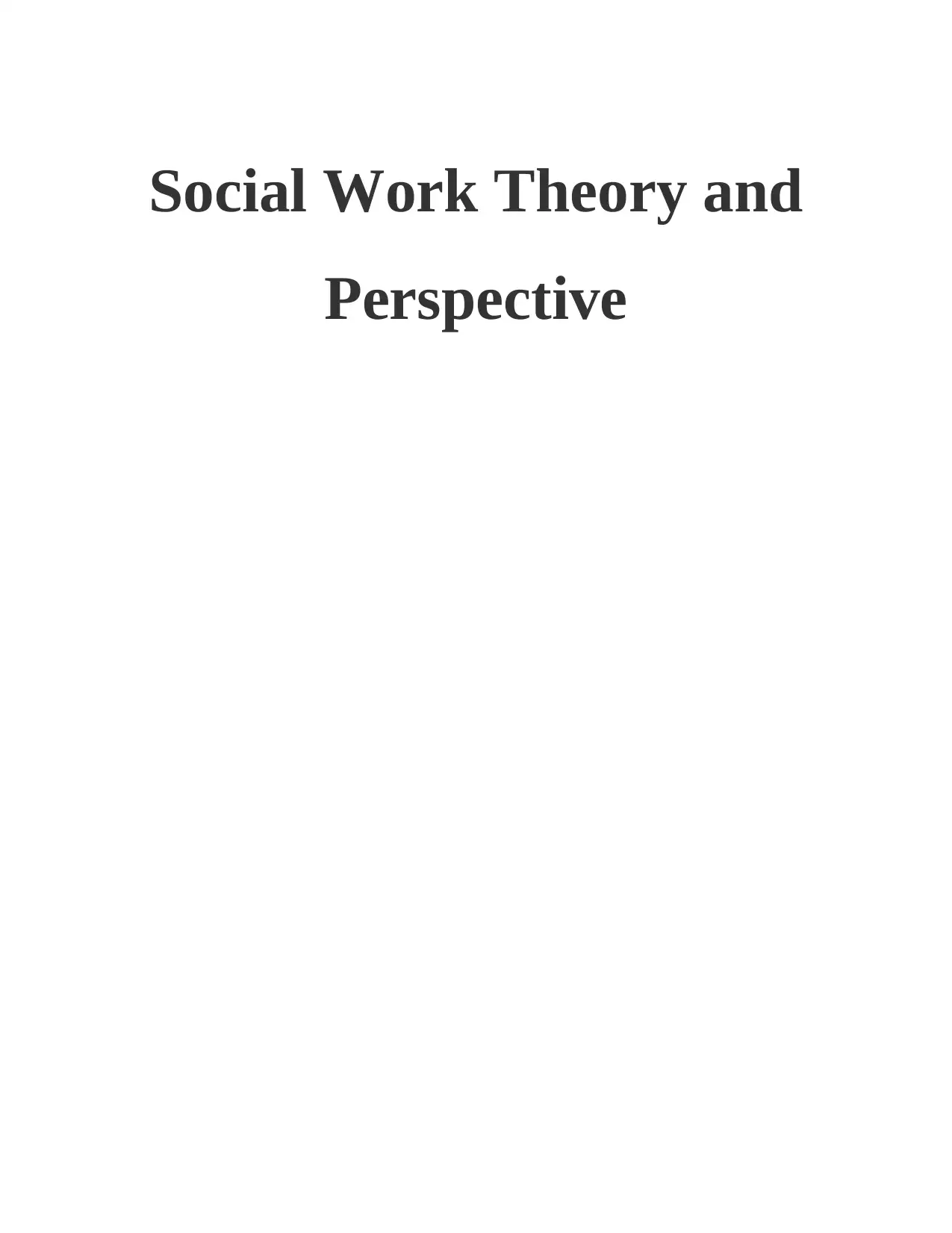
Social Work Theory and
Perspective
Perspective
Paraphrase This Document
Need a fresh take? Get an instant paraphrase of this document with our AI Paraphraser
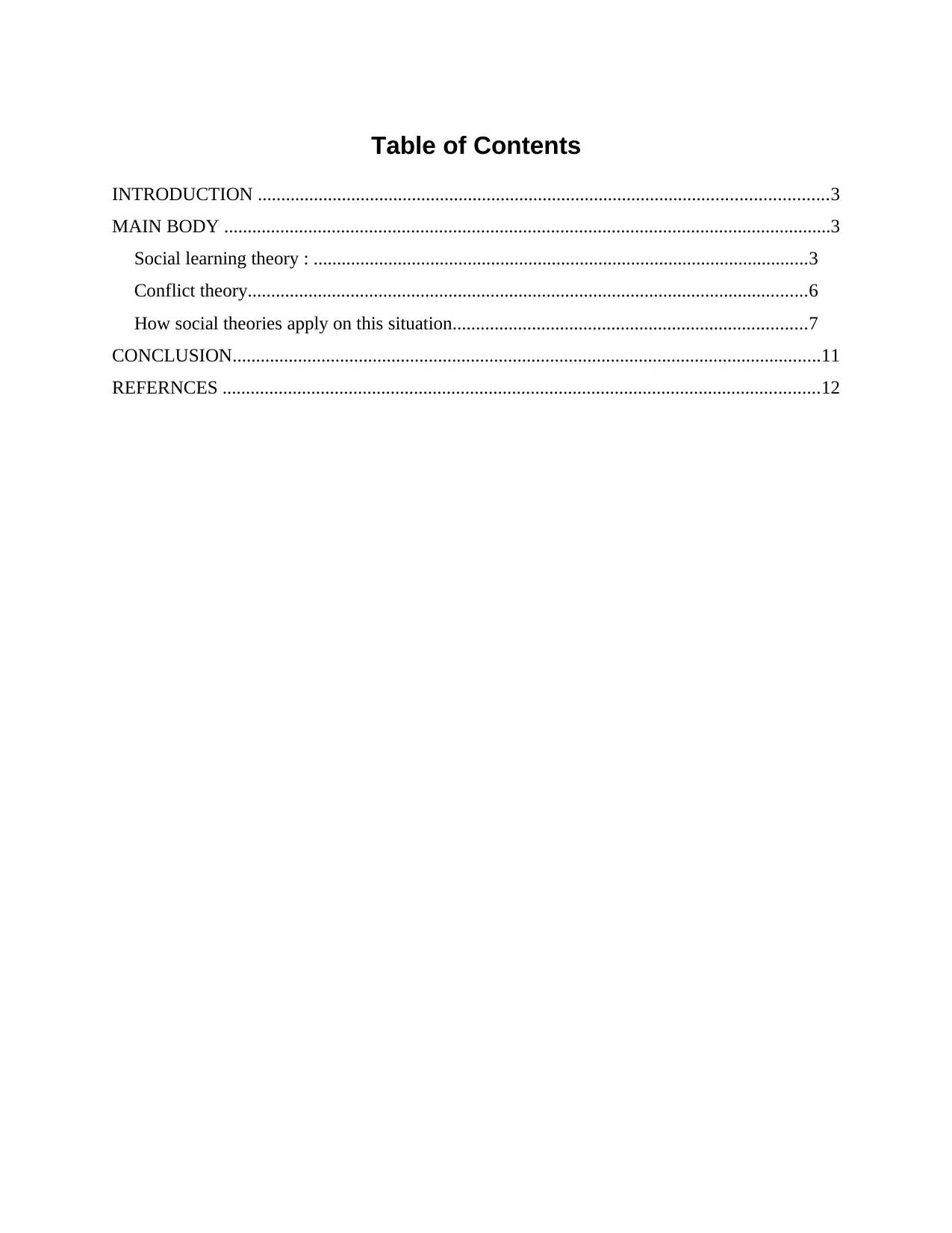
Table of Contents
INTRODUCTION ..........................................................................................................................3
MAIN BODY ..................................................................................................................................3
Social learning theory : ..........................................................................................................3
Conflict theory........................................................................................................................6
How social theories apply on this situation............................................................................7
CONCLUSION..............................................................................................................................11
REFERNCES ................................................................................................................................12
INTRODUCTION ..........................................................................................................................3
MAIN BODY ..................................................................................................................................3
Social learning theory : ..........................................................................................................3
Conflict theory........................................................................................................................6
How social theories apply on this situation............................................................................7
CONCLUSION..............................................................................................................................11
REFERNCES ................................................................................................................................12
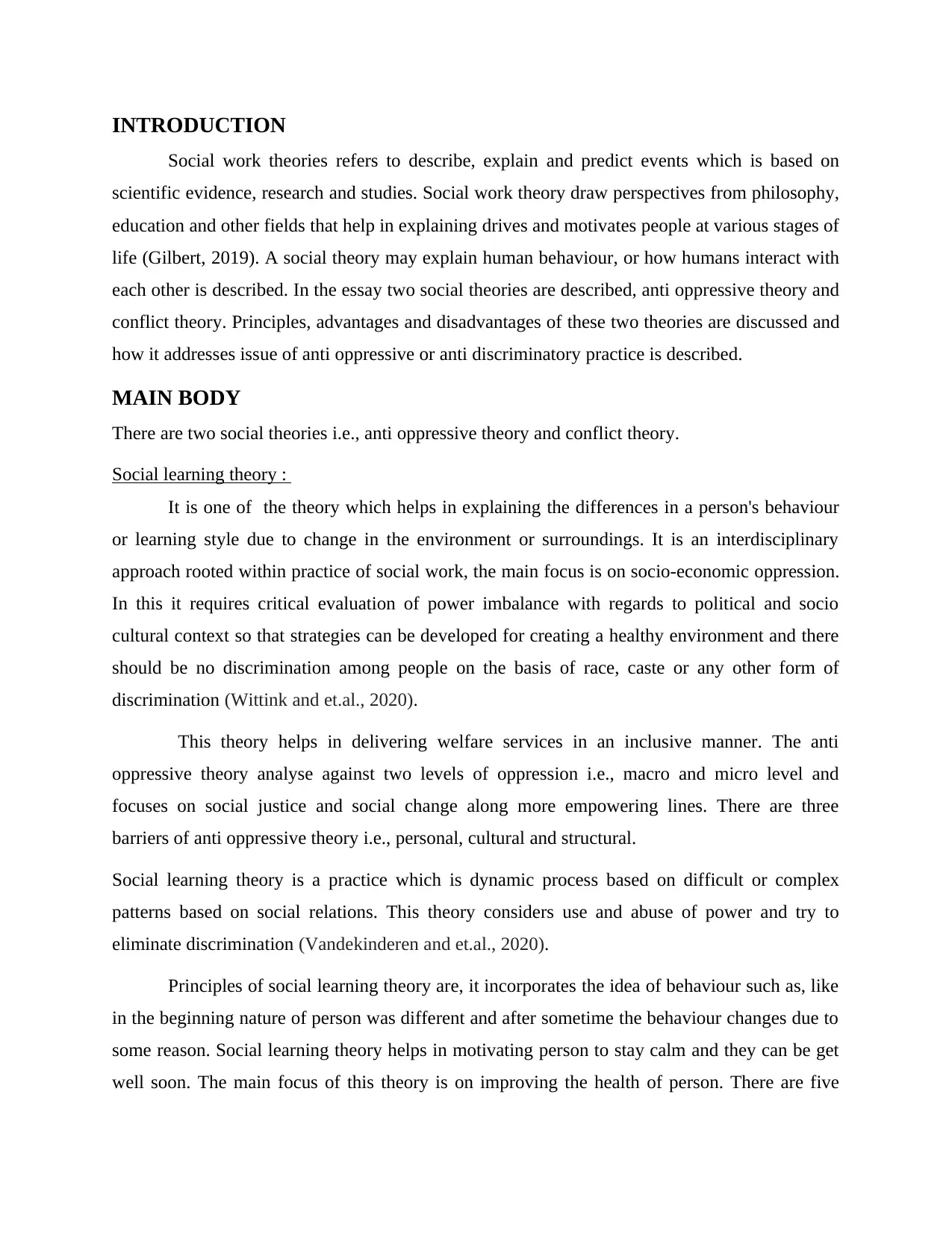
INTRODUCTION
Social work theories refers to describe, explain and predict events which is based on
scientific evidence, research and studies. Social work theory draw perspectives from philosophy,
education and other fields that help in explaining drives and motivates people at various stages of
life (Gilbert, 2019). A social theory may explain human behaviour, or how humans interact with
each other is described. In the essay two social theories are described, anti oppressive theory and
conflict theory. Principles, advantages and disadvantages of these two theories are discussed and
how it addresses issue of anti oppressive or anti discriminatory practice is described.
MAIN BODY
There are two social theories i.e., anti oppressive theory and conflict theory.
Social learning theory :
It is one of the theory which helps in explaining the differences in a person's behaviour
or learning style due to change in the environment or surroundings. It is an interdisciplinary
approach rooted within practice of social work, the main focus is on socio-economic oppression.
In this it requires critical evaluation of power imbalance with regards to political and socio
cultural context so that strategies can be developed for creating a healthy environment and there
should be no discrimination among people on the basis of race, caste or any other form of
discrimination (Wittink and et.al., 2020).
This theory helps in delivering welfare services in an inclusive manner. The anti
oppressive theory analyse against two levels of oppression i.e., macro and micro level and
focuses on social justice and social change along more empowering lines. There are three
barriers of anti oppressive theory i.e., personal, cultural and structural.
Social learning theory is a practice which is dynamic process based on difficult or complex
patterns based on social relations. This theory considers use and abuse of power and try to
eliminate discrimination (Vandekinderen and et.al., 2020).
Principles of social learning theory are, it incorporates the idea of behaviour such as, like
in the beginning nature of person was different and after sometime the behaviour changes due to
some reason. Social learning theory helps in motivating person to stay calm and they can be get
well soon. The main focus of this theory is on improving the health of person. There are five
Social work theories refers to describe, explain and predict events which is based on
scientific evidence, research and studies. Social work theory draw perspectives from philosophy,
education and other fields that help in explaining drives and motivates people at various stages of
life (Gilbert, 2019). A social theory may explain human behaviour, or how humans interact with
each other is described. In the essay two social theories are described, anti oppressive theory and
conflict theory. Principles, advantages and disadvantages of these two theories are discussed and
how it addresses issue of anti oppressive or anti discriminatory practice is described.
MAIN BODY
There are two social theories i.e., anti oppressive theory and conflict theory.
Social learning theory :
It is one of the theory which helps in explaining the differences in a person's behaviour
or learning style due to change in the environment or surroundings. It is an interdisciplinary
approach rooted within practice of social work, the main focus is on socio-economic oppression.
In this it requires critical evaluation of power imbalance with regards to political and socio
cultural context so that strategies can be developed for creating a healthy environment and there
should be no discrimination among people on the basis of race, caste or any other form of
discrimination (Wittink and et.al., 2020).
This theory helps in delivering welfare services in an inclusive manner. The anti
oppressive theory analyse against two levels of oppression i.e., macro and micro level and
focuses on social justice and social change along more empowering lines. There are three
barriers of anti oppressive theory i.e., personal, cultural and structural.
Social learning theory is a practice which is dynamic process based on difficult or complex
patterns based on social relations. This theory considers use and abuse of power and try to
eliminate discrimination (Vandekinderen and et.al., 2020).
Principles of social learning theory are, it incorporates the idea of behaviour such as, like
in the beginning nature of person was different and after sometime the behaviour changes due to
some reason. Social learning theory helps in motivating person to stay calm and they can be get
well soon. The main focus of this theory is on improving the health of person. There are five
⊘ This is a preview!⊘
Do you want full access?
Subscribe today to unlock all pages.

Trusted by 1+ million students worldwide
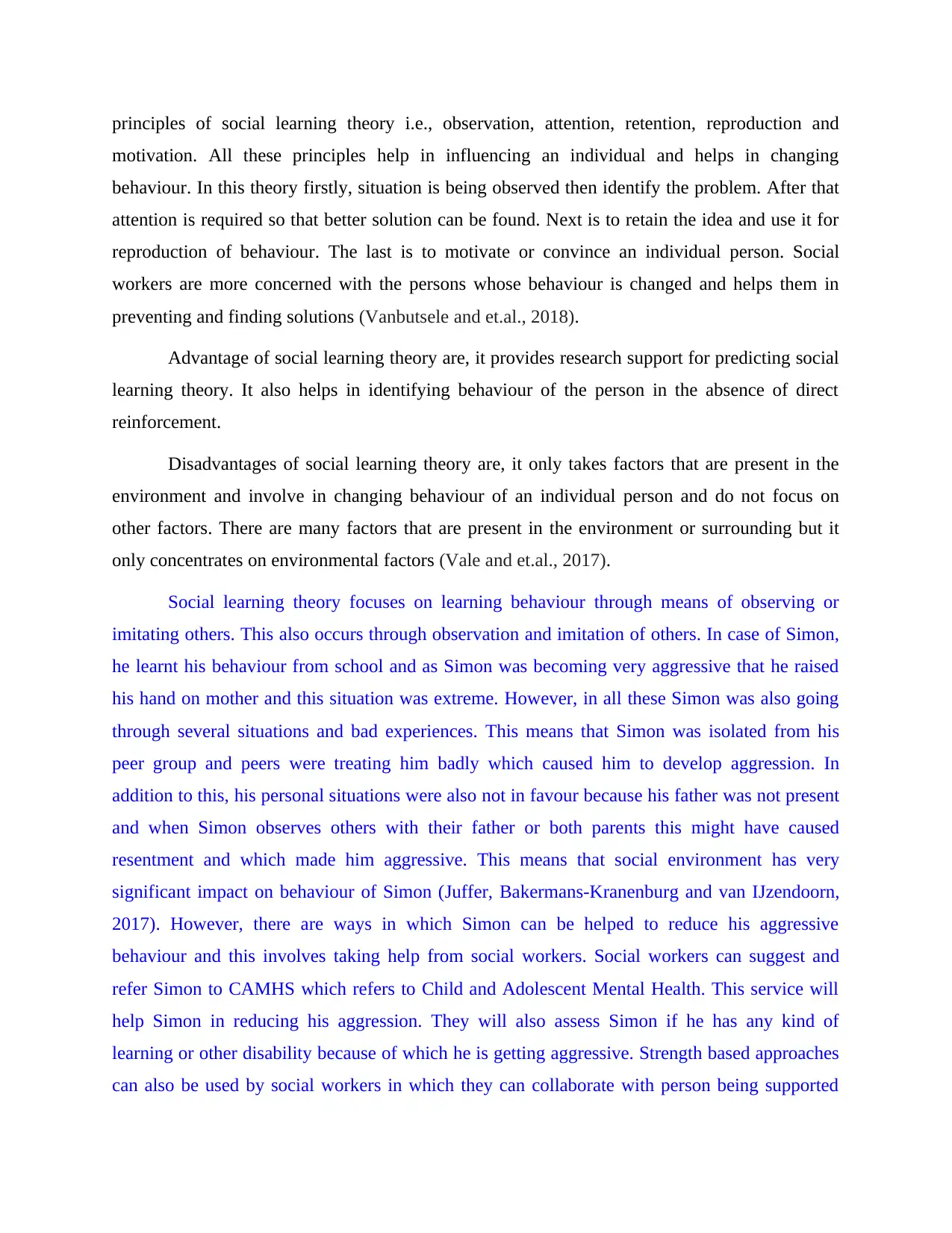
principles of social learning theory i.e., observation, attention, retention, reproduction and
motivation. All these principles help in influencing an individual and helps in changing
behaviour. In this theory firstly, situation is being observed then identify the problem. After that
attention is required so that better solution can be found. Next is to retain the idea and use it for
reproduction of behaviour. The last is to motivate or convince an individual person. Social
workers are more concerned with the persons whose behaviour is changed and helps them in
preventing and finding solutions (Vanbutsele and et.al., 2018).
Advantage of social learning theory are, it provides research support for predicting social
learning theory. It also helps in identifying behaviour of the person in the absence of direct
reinforcement.
Disadvantages of social learning theory are, it only takes factors that are present in the
environment and involve in changing behaviour of an individual person and do not focus on
other factors. There are many factors that are present in the environment or surrounding but it
only concentrates on environmental factors (Vale and et.al., 2017).
Social learning theory focuses on learning behaviour through means of observing or
imitating others. This also occurs through observation and imitation of others. In case of Simon,
he learnt his behaviour from school and as Simon was becoming very aggressive that he raised
his hand on mother and this situation was extreme. However, in all these Simon was also going
through several situations and bad experiences. This means that Simon was isolated from his
peer group and peers were treating him badly which caused him to develop aggression. In
addition to this, his personal situations were also not in favour because his father was not present
and when Simon observes others with their father or both parents this might have caused
resentment and which made him aggressive. This means that social environment has very
significant impact on behaviour of Simon (Juffer, Bakermans-Kranenburg and van IJzendoorn,
2017). However, there are ways in which Simon can be helped to reduce his aggressive
behaviour and this involves taking help from social workers. Social workers can suggest and
refer Simon to CAMHS which refers to Child and Adolescent Mental Health. This service will
help Simon in reducing his aggression. They will also assess Simon if he has any kind of
learning or other disability because of which he is getting aggressive. Strength based approaches
can also be used by social workers in which they can collaborate with person being supported
motivation. All these principles help in influencing an individual and helps in changing
behaviour. In this theory firstly, situation is being observed then identify the problem. After that
attention is required so that better solution can be found. Next is to retain the idea and use it for
reproduction of behaviour. The last is to motivate or convince an individual person. Social
workers are more concerned with the persons whose behaviour is changed and helps them in
preventing and finding solutions (Vanbutsele and et.al., 2018).
Advantage of social learning theory are, it provides research support for predicting social
learning theory. It also helps in identifying behaviour of the person in the absence of direct
reinforcement.
Disadvantages of social learning theory are, it only takes factors that are present in the
environment and involve in changing behaviour of an individual person and do not focus on
other factors. There are many factors that are present in the environment or surrounding but it
only concentrates on environmental factors (Vale and et.al., 2017).
Social learning theory focuses on learning behaviour through means of observing or
imitating others. This also occurs through observation and imitation of others. In case of Simon,
he learnt his behaviour from school and as Simon was becoming very aggressive that he raised
his hand on mother and this situation was extreme. However, in all these Simon was also going
through several situations and bad experiences. This means that Simon was isolated from his
peer group and peers were treating him badly which caused him to develop aggression. In
addition to this, his personal situations were also not in favour because his father was not present
and when Simon observes others with their father or both parents this might have caused
resentment and which made him aggressive. This means that social environment has very
significant impact on behaviour of Simon (Juffer, Bakermans-Kranenburg and van IJzendoorn,
2017). However, there are ways in which Simon can be helped to reduce his aggressive
behaviour and this involves taking help from social workers. Social workers can suggest and
refer Simon to CAMHS which refers to Child and Adolescent Mental Health. This service will
help Simon in reducing his aggression. They will also assess Simon if he has any kind of
learning or other disability because of which he is getting aggressive. Strength based approaches
can also be used by social workers in which they can collaborate with person being supported
Paraphrase This Document
Need a fresh take? Get an instant paraphrase of this document with our AI Paraphraser
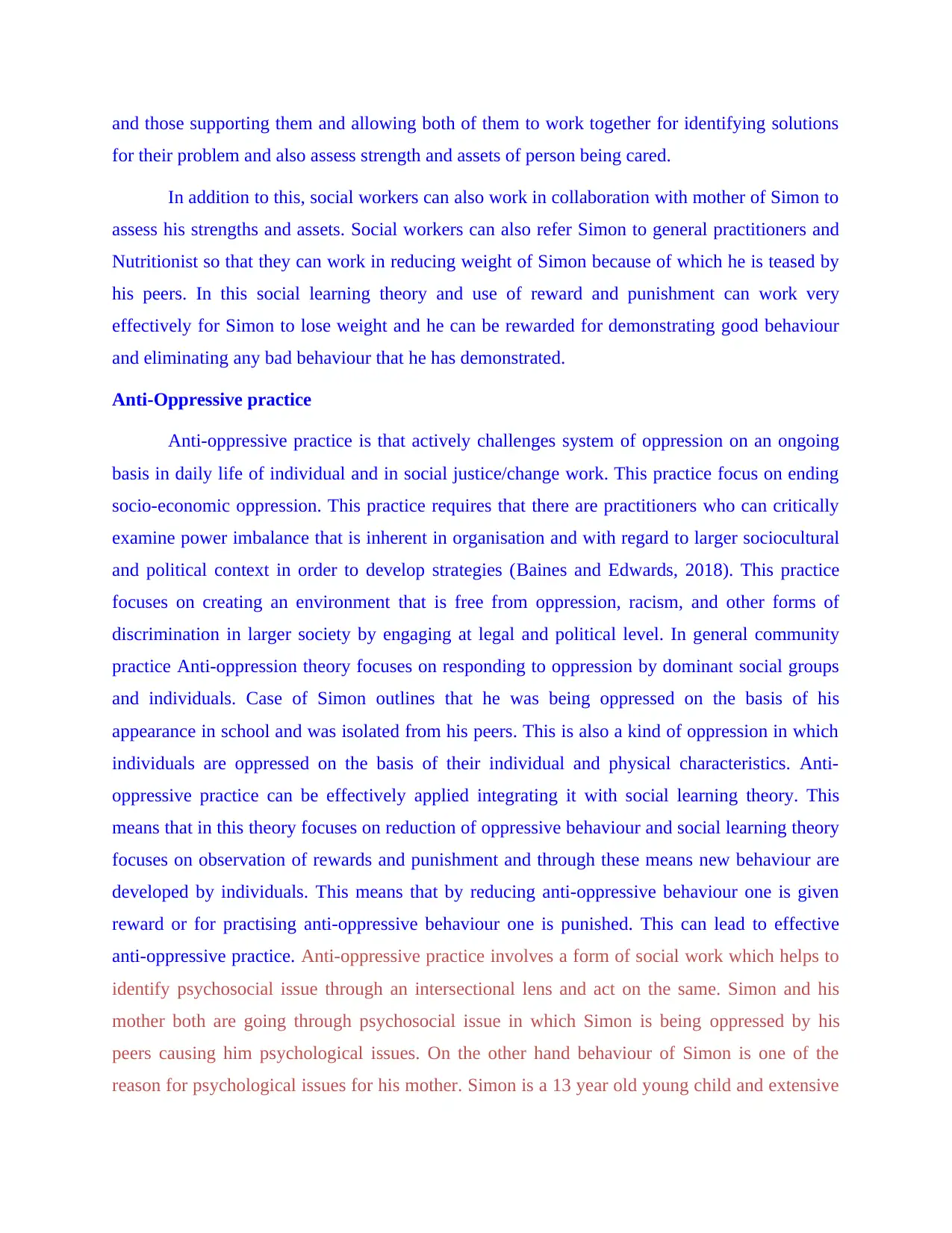
and those supporting them and allowing both of them to work together for identifying solutions
for their problem and also assess strength and assets of person being cared.
In addition to this, social workers can also work in collaboration with mother of Simon to
assess his strengths and assets. Social workers can also refer Simon to general practitioners and
Nutritionist so that they can work in reducing weight of Simon because of which he is teased by
his peers. In this social learning theory and use of reward and punishment can work very
effectively for Simon to lose weight and he can be rewarded for demonstrating good behaviour
and eliminating any bad behaviour that he has demonstrated.
Anti-Oppressive practice
Anti-oppressive practice is that actively challenges system of oppression on an ongoing
basis in daily life of individual and in social justice/change work. This practice focus on ending
socio-economic oppression. This practice requires that there are practitioners who can critically
examine power imbalance that is inherent in organisation and with regard to larger sociocultural
and political context in order to develop strategies (Baines and Edwards, 2018). This practice
focuses on creating an environment that is free from oppression, racism, and other forms of
discrimination in larger society by engaging at legal and political level. In general community
practice Anti-oppression theory focuses on responding to oppression by dominant social groups
and individuals. Case of Simon outlines that he was being oppressed on the basis of his
appearance in school and was isolated from his peers. This is also a kind of oppression in which
individuals are oppressed on the basis of their individual and physical characteristics. Anti-
oppressive practice can be effectively applied integrating it with social learning theory. This
means that in this theory focuses on reduction of oppressive behaviour and social learning theory
focuses on observation of rewards and punishment and through these means new behaviour are
developed by individuals. This means that by reducing anti-oppressive behaviour one is given
reward or for practising anti-oppressive behaviour one is punished. This can lead to effective
anti-oppressive practice. Anti-oppressive practice involves a form of social work which helps to
identify psychosocial issue through an intersectional lens and act on the same. Simon and his
mother both are going through psychosocial issue in which Simon is being oppressed by his
peers causing him psychological issues. On the other hand behaviour of Simon is one of the
reason for psychological issues for his mother. Simon is a 13 year old young child and extensive
for their problem and also assess strength and assets of person being cared.
In addition to this, social workers can also work in collaboration with mother of Simon to
assess his strengths and assets. Social workers can also refer Simon to general practitioners and
Nutritionist so that they can work in reducing weight of Simon because of which he is teased by
his peers. In this social learning theory and use of reward and punishment can work very
effectively for Simon to lose weight and he can be rewarded for demonstrating good behaviour
and eliminating any bad behaviour that he has demonstrated.
Anti-Oppressive practice
Anti-oppressive practice is that actively challenges system of oppression on an ongoing
basis in daily life of individual and in social justice/change work. This practice focus on ending
socio-economic oppression. This practice requires that there are practitioners who can critically
examine power imbalance that is inherent in organisation and with regard to larger sociocultural
and political context in order to develop strategies (Baines and Edwards, 2018). This practice
focuses on creating an environment that is free from oppression, racism, and other forms of
discrimination in larger society by engaging at legal and political level. In general community
practice Anti-oppression theory focuses on responding to oppression by dominant social groups
and individuals. Case of Simon outlines that he was being oppressed on the basis of his
appearance in school and was isolated from his peers. This is also a kind of oppression in which
individuals are oppressed on the basis of their individual and physical characteristics. Anti-
oppressive practice can be effectively applied integrating it with social learning theory. This
means that in this theory focuses on reduction of oppressive behaviour and social learning theory
focuses on observation of rewards and punishment and through these means new behaviour are
developed by individuals. This means that by reducing anti-oppressive behaviour one is given
reward or for practising anti-oppressive behaviour one is punished. This can lead to effective
anti-oppressive practice. Anti-oppressive practice involves a form of social work which helps to
identify psychosocial issue through an intersectional lens and act on the same. Simon and his
mother both are going through psychosocial issue in which Simon is being oppressed by his
peers causing him psychological issues. On the other hand behaviour of Simon is one of the
reason for psychological issues for his mother. Simon is a 13 year old young child and extensive
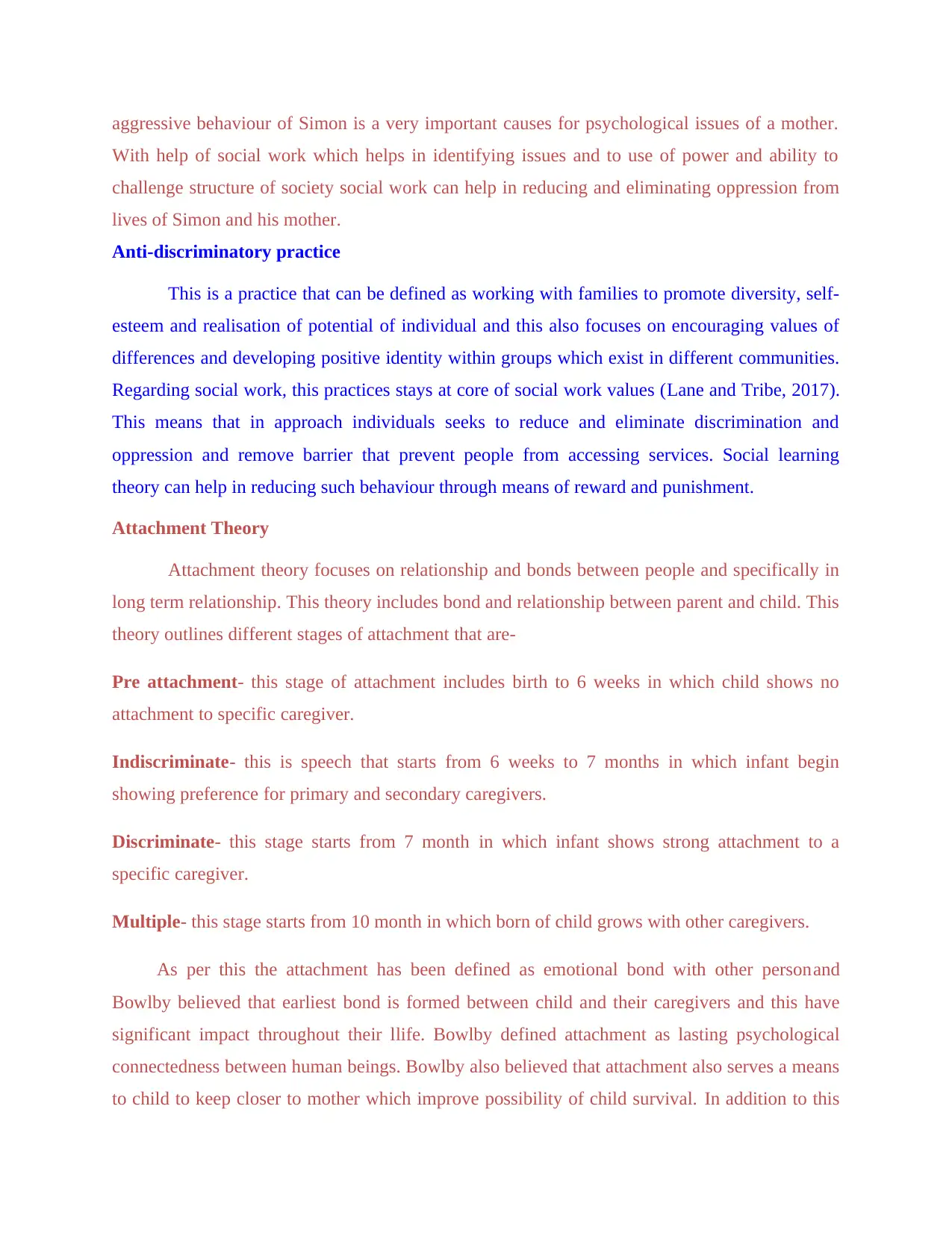
aggressive behaviour of Simon is a very important causes for psychological issues of a mother.
With help of social work which helps in identifying issues and to use of power and ability to
challenge structure of society social work can help in reducing and eliminating oppression from
lives of Simon and his mother.
Anti-discriminatory practice
This is a practice that can be defined as working with families to promote diversity, self-
esteem and realisation of potential of individual and this also focuses on encouraging values of
differences and developing positive identity within groups which exist in different communities.
Regarding social work, this practices stays at core of social work values (Lane and Tribe, 2017).
This means that in approach individuals seeks to reduce and eliminate discrimination and
oppression and remove barrier that prevent people from accessing services. Social learning
theory can help in reducing such behaviour through means of reward and punishment.
Attachment Theory
Attachment theory focuses on relationship and bonds between people and specifically in
long term relationship. This theory includes bond and relationship between parent and child. This
theory outlines different stages of attachment that are-
Pre attachment- this stage of attachment includes birth to 6 weeks in which child shows no
attachment to specific caregiver.
Indiscriminate- this is speech that starts from 6 weeks to 7 months in which infant begin
showing preference for primary and secondary caregivers.
Discriminate- this stage starts from 7 month in which infant shows strong attachment to a
specific caregiver.
Multiple- this stage starts from 10 month in which born of child grows with other caregivers.
As per this the attachment has been defined as emotional bond with other personand
Bowlby believed that earliest bond is formed between child and their caregivers and this have
significant impact throughout their llife. Bowlby defined attachment as lasting psychological
connectedness between human beings. Bowlby also believed that attachment also serves a means
to child to keep closer to mother which improve possibility of child survival. In addition to this
With help of social work which helps in identifying issues and to use of power and ability to
challenge structure of society social work can help in reducing and eliminating oppression from
lives of Simon and his mother.
Anti-discriminatory practice
This is a practice that can be defined as working with families to promote diversity, self-
esteem and realisation of potential of individual and this also focuses on encouraging values of
differences and developing positive identity within groups which exist in different communities.
Regarding social work, this practices stays at core of social work values (Lane and Tribe, 2017).
This means that in approach individuals seeks to reduce and eliminate discrimination and
oppression and remove barrier that prevent people from accessing services. Social learning
theory can help in reducing such behaviour through means of reward and punishment.
Attachment Theory
Attachment theory focuses on relationship and bonds between people and specifically in
long term relationship. This theory includes bond and relationship between parent and child. This
theory outlines different stages of attachment that are-
Pre attachment- this stage of attachment includes birth to 6 weeks in which child shows no
attachment to specific caregiver.
Indiscriminate- this is speech that starts from 6 weeks to 7 months in which infant begin
showing preference for primary and secondary caregivers.
Discriminate- this stage starts from 7 month in which infant shows strong attachment to a
specific caregiver.
Multiple- this stage starts from 10 month in which born of child grows with other caregivers.
As per this the attachment has been defined as emotional bond with other personand
Bowlby believed that earliest bond is formed between child and their caregivers and this have
significant impact throughout their llife. Bowlby defined attachment as lasting psychological
connectedness between human beings. Bowlby also believed that attachment also serves a means
to child to keep closer to mother which improve possibility of child survival. In addition to this
⊘ This is a preview!⊘
Do you want full access?
Subscribe today to unlock all pages.

Trusted by 1+ million students worldwide
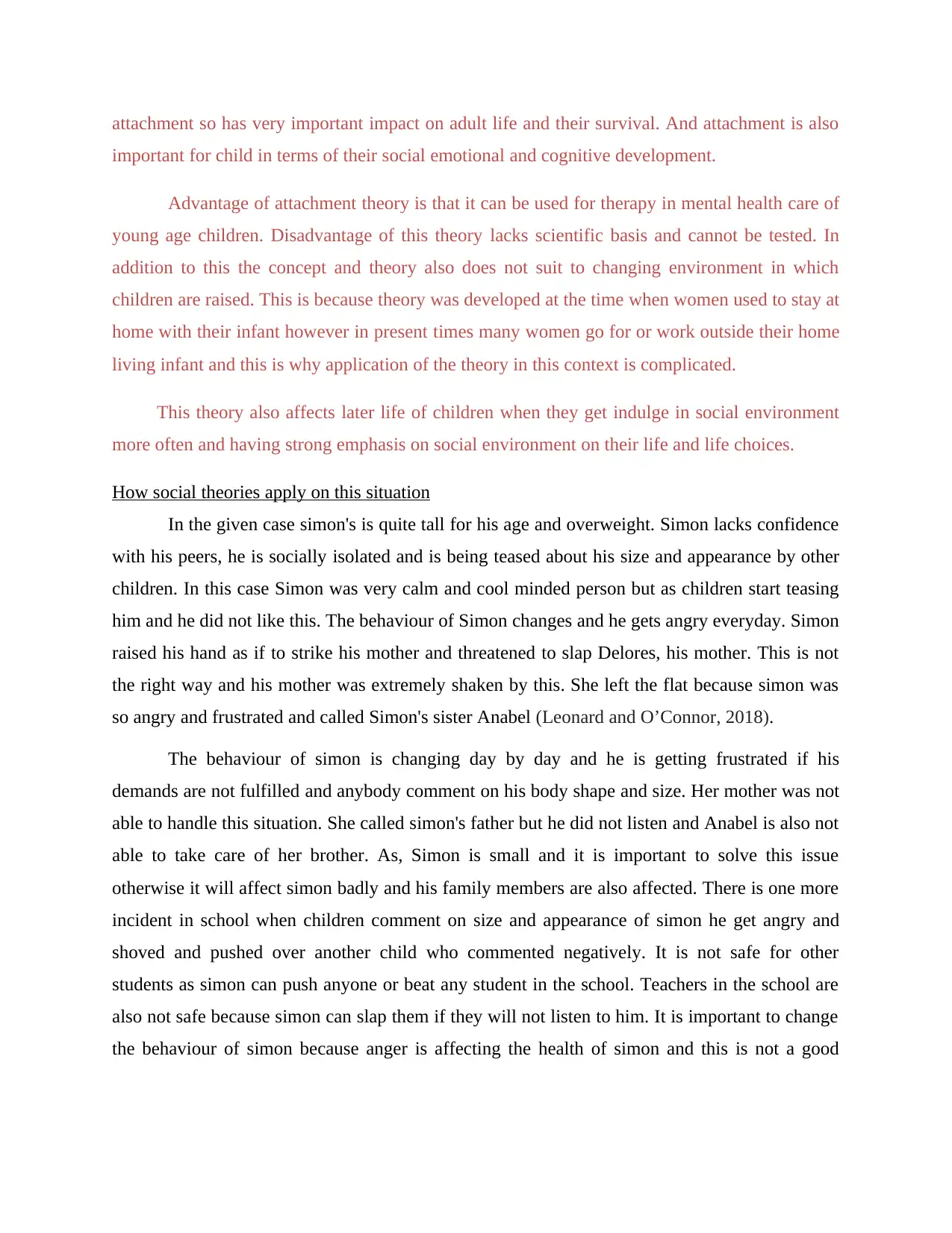
attachment so has very important impact on adult life and their survival. And attachment is also
important for child in terms of their social emotional and cognitive development.
Advantage of attachment theory is that it can be used for therapy in mental health care of
young age children. Disadvantage of this theory lacks scientific basis and cannot be tested. In
addition to this the concept and theory also does not suit to changing environment in which
children are raised. This is because theory was developed at the time when women used to stay at
home with their infant however in present times many women go for or work outside their home
living infant and this is why application of the theory in this context is complicated.
This theory also affects later life of children when they get indulge in social environment
more often and having strong emphasis on social environment on their life and life choices.
How social theories apply on this situation
In the given case simon's is quite tall for his age and overweight. Simon lacks confidence
with his peers, he is socially isolated and is being teased about his size and appearance by other
children. In this case Simon was very calm and cool minded person but as children start teasing
him and he did not like this. The behaviour of Simon changes and he gets angry everyday. Simon
raised his hand as if to strike his mother and threatened to slap Delores, his mother. This is not
the right way and his mother was extremely shaken by this. She left the flat because simon was
so angry and frustrated and called Simon's sister Anabel (Leonard and O’Connor, 2018).
The behaviour of simon is changing day by day and he is getting frustrated if his
demands are not fulfilled and anybody comment on his body shape and size. Her mother was not
able to handle this situation. She called simon's father but he did not listen and Anabel is also not
able to take care of her brother. As, Simon is small and it is important to solve this issue
otherwise it will affect simon badly and his family members are also affected. There is one more
incident in school when children comment on size and appearance of simon he get angry and
shoved and pushed over another child who commented negatively. It is not safe for other
students as simon can push anyone or beat any student in the school. Teachers in the school are
also not safe because simon can slap them if they will not listen to him. It is important to change
the behaviour of simon because anger is affecting the health of simon and this is not a good
important for child in terms of their social emotional and cognitive development.
Advantage of attachment theory is that it can be used for therapy in mental health care of
young age children. Disadvantage of this theory lacks scientific basis and cannot be tested. In
addition to this the concept and theory also does not suit to changing environment in which
children are raised. This is because theory was developed at the time when women used to stay at
home with their infant however in present times many women go for or work outside their home
living infant and this is why application of the theory in this context is complicated.
This theory also affects later life of children when they get indulge in social environment
more often and having strong emphasis on social environment on their life and life choices.
How social theories apply on this situation
In the given case simon's is quite tall for his age and overweight. Simon lacks confidence
with his peers, he is socially isolated and is being teased about his size and appearance by other
children. In this case Simon was very calm and cool minded person but as children start teasing
him and he did not like this. The behaviour of Simon changes and he gets angry everyday. Simon
raised his hand as if to strike his mother and threatened to slap Delores, his mother. This is not
the right way and his mother was extremely shaken by this. She left the flat because simon was
so angry and frustrated and called Simon's sister Anabel (Leonard and O’Connor, 2018).
The behaviour of simon is changing day by day and he is getting frustrated if his
demands are not fulfilled and anybody comment on his body shape and size. Her mother was not
able to handle this situation. She called simon's father but he did not listen and Anabel is also not
able to take care of her brother. As, Simon is small and it is important to solve this issue
otherwise it will affect simon badly and his family members are also affected. There is one more
incident in school when children comment on size and appearance of simon he get angry and
shoved and pushed over another child who commented negatively. It is not safe for other
students as simon can push anyone or beat any student in the school. Teachers in the school are
also not safe because simon can slap them if they will not listen to him. It is important to change
the behaviour of simon because anger is affecting the health of simon and this is not a good
Paraphrase This Document
Need a fresh take? Get an instant paraphrase of this document with our AI Paraphraser
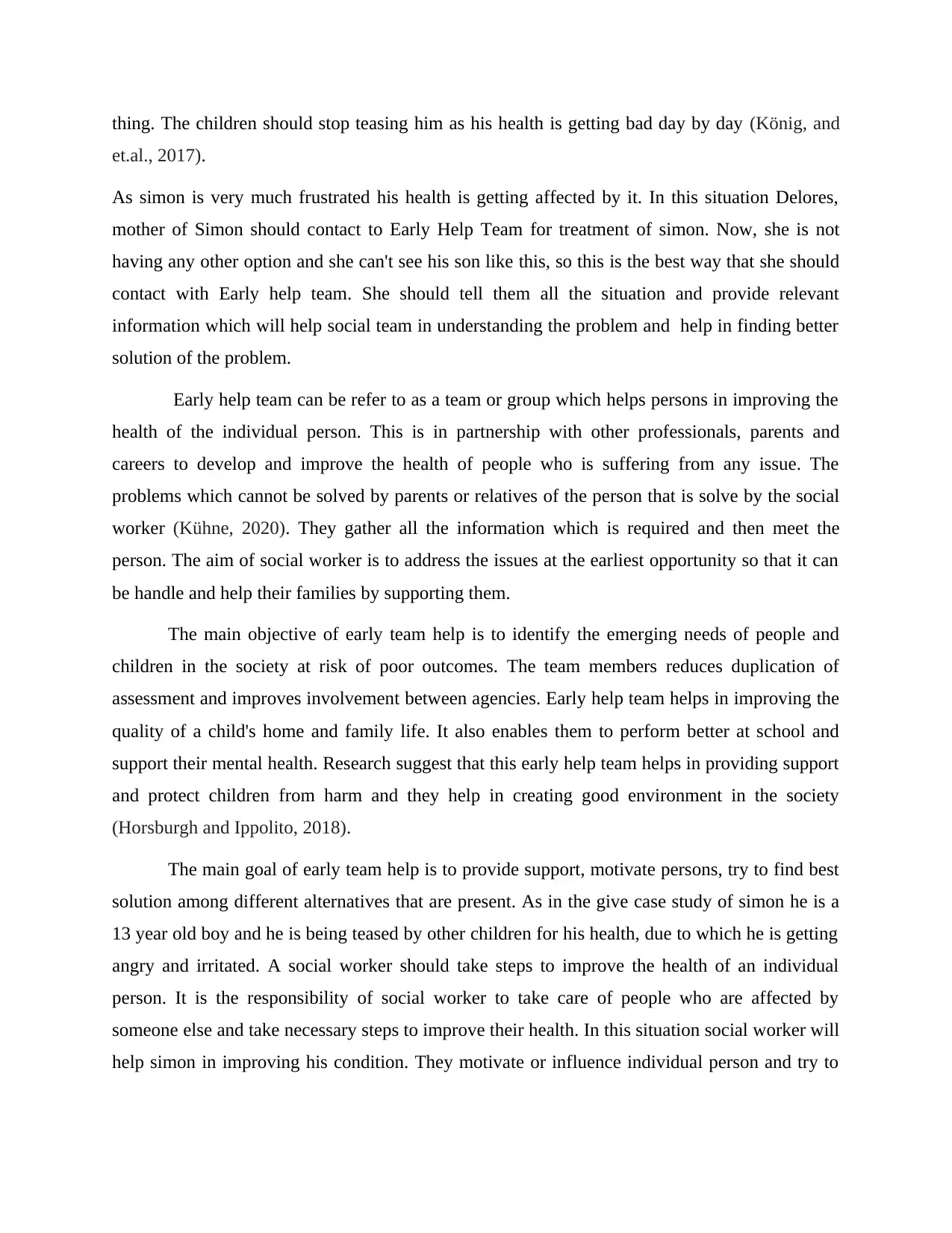
thing. The children should stop teasing him as his health is getting bad day by day (König, and
et.al., 2017).
As simon is very much frustrated his health is getting affected by it. In this situation Delores,
mother of Simon should contact to Early Help Team for treatment of simon. Now, she is not
having any other option and she can't see his son like this, so this is the best way that she should
contact with Early help team. She should tell them all the situation and provide relevant
information which will help social team in understanding the problem and help in finding better
solution of the problem.
Early help team can be refer to as a team or group which helps persons in improving the
health of the individual person. This is in partnership with other professionals, parents and
careers to develop and improve the health of people who is suffering from any issue. The
problems which cannot be solved by parents or relatives of the person that is solve by the social
worker (Kühne, 2020). They gather all the information which is required and then meet the
person. The aim of social worker is to address the issues at the earliest opportunity so that it can
be handle and help their families by supporting them.
The main objective of early team help is to identify the emerging needs of people and
children in the society at risk of poor outcomes. The team members reduces duplication of
assessment and improves involvement between agencies. Early help team helps in improving the
quality of a child's home and family life. It also enables them to perform better at school and
support their mental health. Research suggest that this early help team helps in providing support
and protect children from harm and they help in creating good environment in the society
(Horsburgh and Ippolito, 2018).
The main goal of early team help is to provide support, motivate persons, try to find best
solution among different alternatives that are present. As in the give case study of simon he is a
13 year old boy and he is being teased by other children for his health, due to which he is getting
angry and irritated. A social worker should take steps to improve the health of an individual
person. It is the responsibility of social worker to take care of people who are affected by
someone else and take necessary steps to improve their health. In this situation social worker will
help simon in improving his condition. They motivate or influence individual person and try to
et.al., 2017).
As simon is very much frustrated his health is getting affected by it. In this situation Delores,
mother of Simon should contact to Early Help Team for treatment of simon. Now, she is not
having any other option and she can't see his son like this, so this is the best way that she should
contact with Early help team. She should tell them all the situation and provide relevant
information which will help social team in understanding the problem and help in finding better
solution of the problem.
Early help team can be refer to as a team or group which helps persons in improving the
health of the individual person. This is in partnership with other professionals, parents and
careers to develop and improve the health of people who is suffering from any issue. The
problems which cannot be solved by parents or relatives of the person that is solve by the social
worker (Kühne, 2020). They gather all the information which is required and then meet the
person. The aim of social worker is to address the issues at the earliest opportunity so that it can
be handle and help their families by supporting them.
The main objective of early team help is to identify the emerging needs of people and
children in the society at risk of poor outcomes. The team members reduces duplication of
assessment and improves involvement between agencies. Early help team helps in improving the
quality of a child's home and family life. It also enables them to perform better at school and
support their mental health. Research suggest that this early help team helps in providing support
and protect children from harm and they help in creating good environment in the society
(Horsburgh and Ippolito, 2018).
The main goal of early team help is to provide support, motivate persons, try to find best
solution among different alternatives that are present. As in the give case study of simon he is a
13 year old boy and he is being teased by other children for his health, due to which he is getting
angry and irritated. A social worker should take steps to improve the health of an individual
person. It is the responsibility of social worker to take care of people who are affected by
someone else and take necessary steps to improve their health. In this situation social worker will
help simon in improving his condition. They motivate or influence individual person and try to
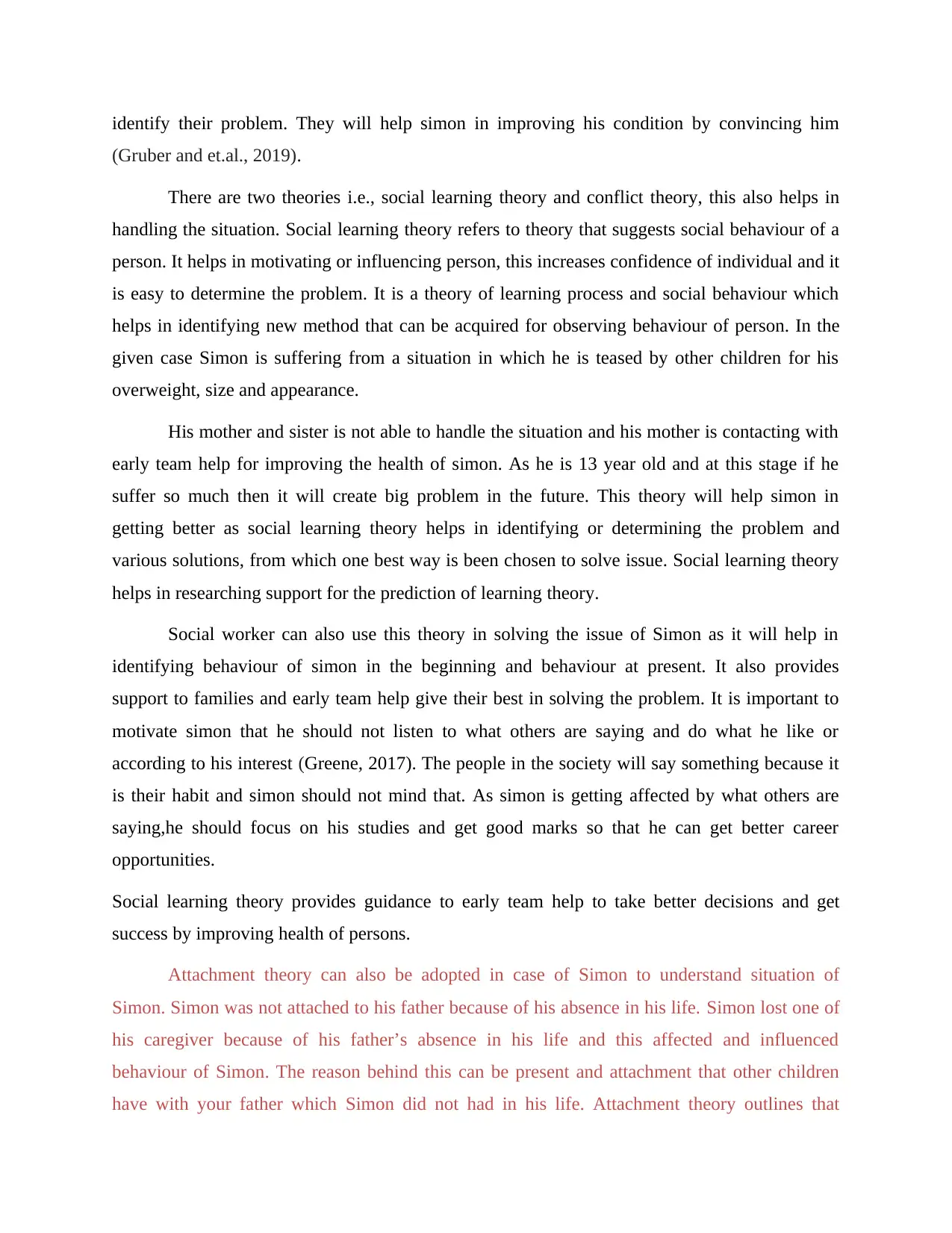
identify their problem. They will help simon in improving his condition by convincing him
(Gruber and et.al., 2019).
There are two theories i.e., social learning theory and conflict theory, this also helps in
handling the situation. Social learning theory refers to theory that suggests social behaviour of a
person. It helps in motivating or influencing person, this increases confidence of individual and it
is easy to determine the problem. It is a theory of learning process and social behaviour which
helps in identifying new method that can be acquired for observing behaviour of person. In the
given case Simon is suffering from a situation in which he is teased by other children for his
overweight, size and appearance.
His mother and sister is not able to handle the situation and his mother is contacting with
early team help for improving the health of simon. As he is 13 year old and at this stage if he
suffer so much then it will create big problem in the future. This theory will help simon in
getting better as social learning theory helps in identifying or determining the problem and
various solutions, from which one best way is been chosen to solve issue. Social learning theory
helps in researching support for the prediction of learning theory.
Social worker can also use this theory in solving the issue of Simon as it will help in
identifying behaviour of simon in the beginning and behaviour at present. It also provides
support to families and early team help give their best in solving the problem. It is important to
motivate simon that he should not listen to what others are saying and do what he like or
according to his interest (Greene, 2017). The people in the society will say something because it
is their habit and simon should not mind that. As simon is getting affected by what others are
saying,he should focus on his studies and get good marks so that he can get better career
opportunities.
Social learning theory provides guidance to early team help to take better decisions and get
success by improving health of persons.
Attachment theory can also be adopted in case of Simon to understand situation of
Simon. Simon was not attached to his father because of his absence in his life. Simon lost one of
his caregiver because of his father’s absence in his life and this affected and influenced
behaviour of Simon. The reason behind this can be present and attachment that other children
have with your father which Simon did not had in his life. Attachment theory outlines that
(Gruber and et.al., 2019).
There are two theories i.e., social learning theory and conflict theory, this also helps in
handling the situation. Social learning theory refers to theory that suggests social behaviour of a
person. It helps in motivating or influencing person, this increases confidence of individual and it
is easy to determine the problem. It is a theory of learning process and social behaviour which
helps in identifying new method that can be acquired for observing behaviour of person. In the
given case Simon is suffering from a situation in which he is teased by other children for his
overweight, size and appearance.
His mother and sister is not able to handle the situation and his mother is contacting with
early team help for improving the health of simon. As he is 13 year old and at this stage if he
suffer so much then it will create big problem in the future. This theory will help simon in
getting better as social learning theory helps in identifying or determining the problem and
various solutions, from which one best way is been chosen to solve issue. Social learning theory
helps in researching support for the prediction of learning theory.
Social worker can also use this theory in solving the issue of Simon as it will help in
identifying behaviour of simon in the beginning and behaviour at present. It also provides
support to families and early team help give their best in solving the problem. It is important to
motivate simon that he should not listen to what others are saying and do what he like or
according to his interest (Greene, 2017). The people in the society will say something because it
is their habit and simon should not mind that. As simon is getting affected by what others are
saying,he should focus on his studies and get good marks so that he can get better career
opportunities.
Social learning theory provides guidance to early team help to take better decisions and get
success by improving health of persons.
Attachment theory can also be adopted in case of Simon to understand situation of
Simon. Simon was not attached to his father because of his absence in his life. Simon lost one of
his caregiver because of his father’s absence in his life and this affected and influenced
behaviour of Simon. The reason behind this can be present and attachment that other children
have with your father which Simon did not had in his life. Attachment theory outlines that
⊘ This is a preview!⊘
Do you want full access?
Subscribe today to unlock all pages.

Trusted by 1+ million students worldwide
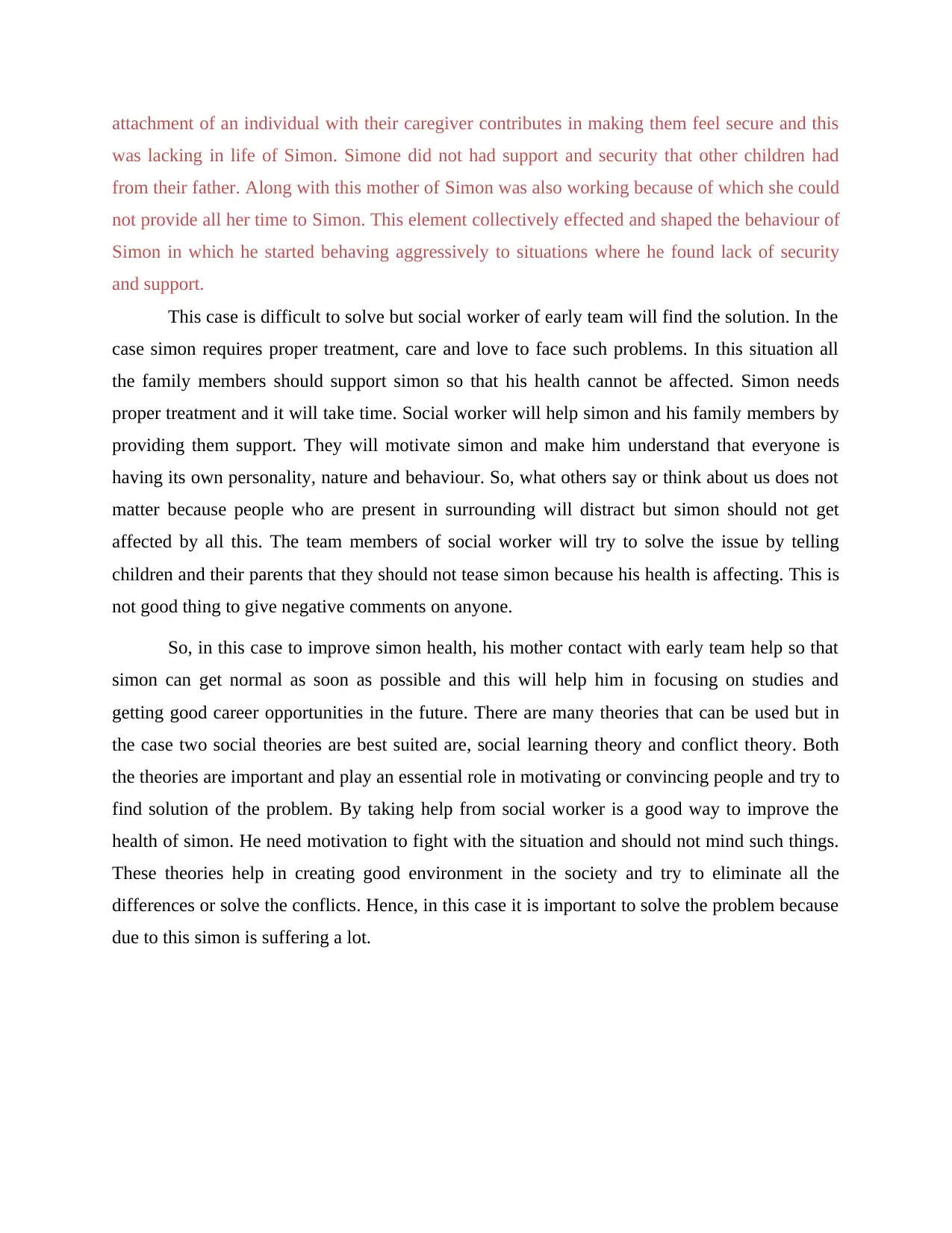
attachment of an individual with their caregiver contributes in making them feel secure and this
was lacking in life of Simon. Simone did not had support and security that other children had
from their father. Along with this mother of Simon was also working because of which she could
not provide all her time to Simon. This element collectively effected and shaped the behaviour of
Simon in which he started behaving aggressively to situations where he found lack of security
and support.
This case is difficult to solve but social worker of early team will find the solution. In the
case simon requires proper treatment, care and love to face such problems. In this situation all
the family members should support simon so that his health cannot be affected. Simon needs
proper treatment and it will take time. Social worker will help simon and his family members by
providing them support. They will motivate simon and make him understand that everyone is
having its own personality, nature and behaviour. So, what others say or think about us does not
matter because people who are present in surrounding will distract but simon should not get
affected by all this. The team members of social worker will try to solve the issue by telling
children and their parents that they should not tease simon because his health is affecting. This is
not good thing to give negative comments on anyone.
So, in this case to improve simon health, his mother contact with early team help so that
simon can get normal as soon as possible and this will help him in focusing on studies and
getting good career opportunities in the future. There are many theories that can be used but in
the case two social theories are best suited are, social learning theory and conflict theory. Both
the theories are important and play an essential role in motivating or convincing people and try to
find solution of the problem. By taking help from social worker is a good way to improve the
health of simon. He need motivation to fight with the situation and should not mind such things.
These theories help in creating good environment in the society and try to eliminate all the
differences or solve the conflicts. Hence, in this case it is important to solve the problem because
due to this simon is suffering a lot.
was lacking in life of Simon. Simone did not had support and security that other children had
from their father. Along with this mother of Simon was also working because of which she could
not provide all her time to Simon. This element collectively effected and shaped the behaviour of
Simon in which he started behaving aggressively to situations where he found lack of security
and support.
This case is difficult to solve but social worker of early team will find the solution. In the
case simon requires proper treatment, care and love to face such problems. In this situation all
the family members should support simon so that his health cannot be affected. Simon needs
proper treatment and it will take time. Social worker will help simon and his family members by
providing them support. They will motivate simon and make him understand that everyone is
having its own personality, nature and behaviour. So, what others say or think about us does not
matter because people who are present in surrounding will distract but simon should not get
affected by all this. The team members of social worker will try to solve the issue by telling
children and their parents that they should not tease simon because his health is affecting. This is
not good thing to give negative comments on anyone.
So, in this case to improve simon health, his mother contact with early team help so that
simon can get normal as soon as possible and this will help him in focusing on studies and
getting good career opportunities in the future. There are many theories that can be used but in
the case two social theories are best suited are, social learning theory and conflict theory. Both
the theories are important and play an essential role in motivating or convincing people and try to
find solution of the problem. By taking help from social worker is a good way to improve the
health of simon. He need motivation to fight with the situation and should not mind such things.
These theories help in creating good environment in the society and try to eliminate all the
differences or solve the conflicts. Hence, in this case it is important to solve the problem because
due to this simon is suffering a lot.
Paraphrase This Document
Need a fresh take? Get an instant paraphrase of this document with our AI Paraphraser
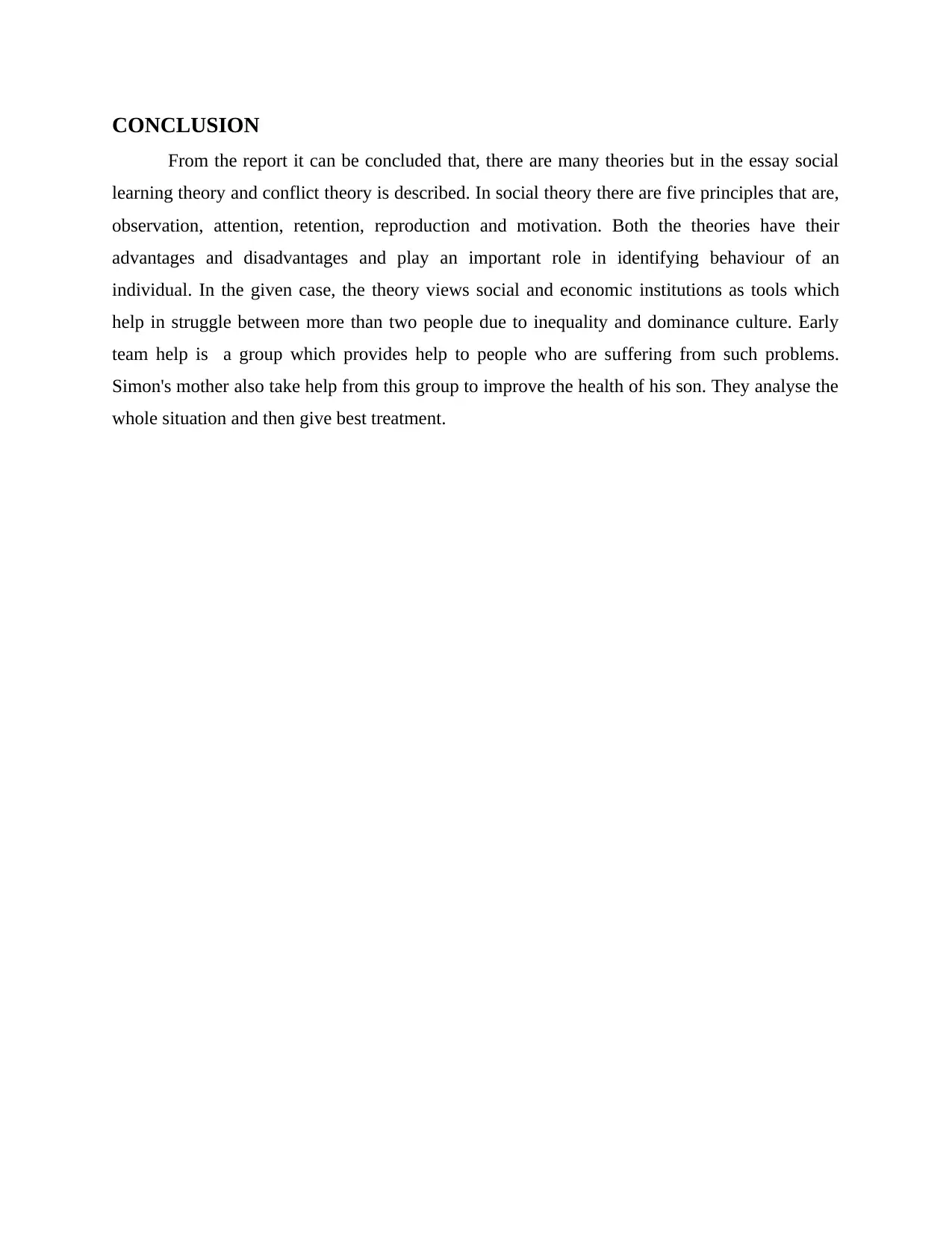
CONCLUSION
From the report it can be concluded that, there are many theories but in the essay social
learning theory and conflict theory is described. In social theory there are five principles that are,
observation, attention, retention, reproduction and motivation. Both the theories have their
advantages and disadvantages and play an important role in identifying behaviour of an
individual. In the given case, the theory views social and economic institutions as tools which
help in struggle between more than two people due to inequality and dominance culture. Early
team help is a group which provides help to people who are suffering from such problems.
Simon's mother also take help from this group to improve the health of his son. They analyse the
whole situation and then give best treatment.
From the report it can be concluded that, there are many theories but in the essay social
learning theory and conflict theory is described. In social theory there are five principles that are,
observation, attention, retention, reproduction and motivation. Both the theories have their
advantages and disadvantages and play an important role in identifying behaviour of an
individual. In the given case, the theory views social and economic institutions as tools which
help in struggle between more than two people due to inequality and dominance culture. Early
team help is a group which provides help to people who are suffering from such problems.
Simon's mother also take help from this group to improve the health of his son. They analyse the
whole situation and then give best treatment.
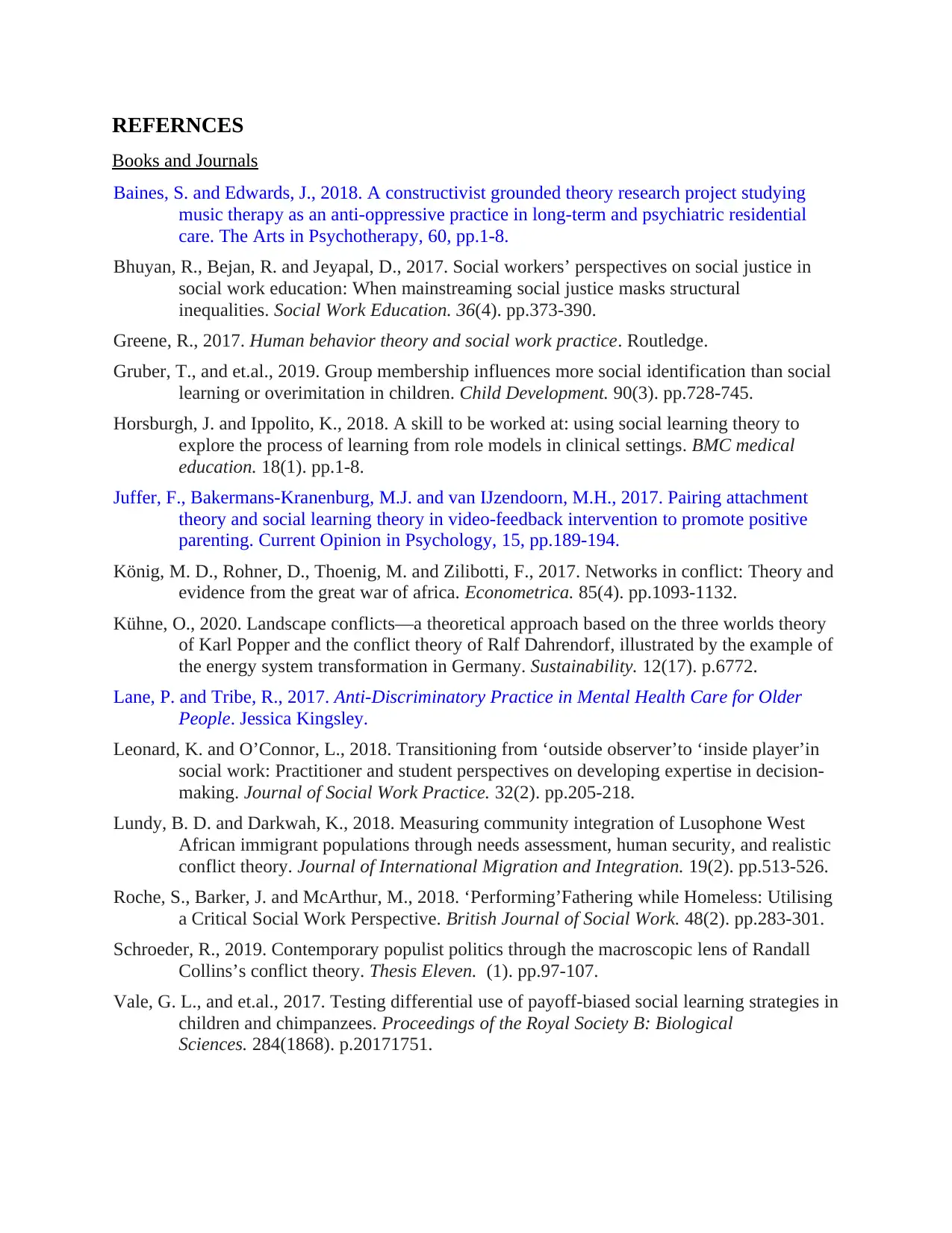
REFERNCES
Books and Journals
Baines, S. and Edwards, J., 2018. A constructivist grounded theory research project studying
music therapy as an anti-oppressive practice in long-term and psychiatric residential
care. The Arts in Psychotherapy, 60, pp.1-8.
Bhuyan, R., Bejan, R. and Jeyapal, D., 2017. Social workers’ perspectives on social justice in
social work education: When mainstreaming social justice masks structural
inequalities. Social Work Education. 36(4). pp.373-390.
Greene, R., 2017. Human behavior theory and social work practice. Routledge.
Gruber, T., and et.al., 2019. Group membership influences more social identification than social
learning or overimitation in children. Child Development. 90(3). pp.728-745.
Horsburgh, J. and Ippolito, K., 2018. A skill to be worked at: using social learning theory to
explore the process of learning from role models in clinical settings. BMC medical
education. 18(1). pp.1-8.
Juffer, F., Bakermans-Kranenburg, M.J. and van IJzendoorn, M.H., 2017. Pairing attachment
theory and social learning theory in video-feedback intervention to promote positive
parenting. Current Opinion in Psychology, 15, pp.189-194.
König, M. D., Rohner, D., Thoenig, M. and Zilibotti, F., 2017. Networks in conflict: Theory and
evidence from the great war of africa. Econometrica. 85(4). pp.1093-1132.
Kühne, O., 2020. Landscape conflicts—a theoretical approach based on the three worlds theory
of Karl Popper and the conflict theory of Ralf Dahrendorf, illustrated by the example of
the energy system transformation in Germany. Sustainability. 12(17). p.6772.
Lane, P. and Tribe, R., 2017. Anti-Discriminatory Practice in Mental Health Care for Older
People. Jessica Kingsley.
Leonard, K. and O’Connor, L., 2018. Transitioning from ‘outside observer’to ‘inside player’in
social work: Practitioner and student perspectives on developing expertise in decision-
making. Journal of Social Work Practice. 32(2). pp.205-218.
Lundy, B. D. and Darkwah, K., 2018. Measuring community integration of Lusophone West
African immigrant populations through needs assessment, human security, and realistic
conflict theory. Journal of International Migration and Integration. 19(2). pp.513-526.
Roche, S., Barker, J. and McArthur, M., 2018. ‘Performing’Fathering while Homeless: Utilising
a Critical Social Work Perspective. British Journal of Social Work. 48(2). pp.283-301.
Schroeder, R., 2019. Contemporary populist politics through the macroscopic lens of Randall
Collins’s conflict theory. Thesis Eleven. (1). pp.97-107.
Vale, G. L., and et.al., 2017. Testing differential use of payoff-biased social learning strategies in
children and chimpanzees. Proceedings of the Royal Society B: Biological
Sciences. 284(1868). p.20171751.
Books and Journals
Baines, S. and Edwards, J., 2018. A constructivist grounded theory research project studying
music therapy as an anti-oppressive practice in long-term and psychiatric residential
care. The Arts in Psychotherapy, 60, pp.1-8.
Bhuyan, R., Bejan, R. and Jeyapal, D., 2017. Social workers’ perspectives on social justice in
social work education: When mainstreaming social justice masks structural
inequalities. Social Work Education. 36(4). pp.373-390.
Greene, R., 2017. Human behavior theory and social work practice. Routledge.
Gruber, T., and et.al., 2019. Group membership influences more social identification than social
learning or overimitation in children. Child Development. 90(3). pp.728-745.
Horsburgh, J. and Ippolito, K., 2018. A skill to be worked at: using social learning theory to
explore the process of learning from role models in clinical settings. BMC medical
education. 18(1). pp.1-8.
Juffer, F., Bakermans-Kranenburg, M.J. and van IJzendoorn, M.H., 2017. Pairing attachment
theory and social learning theory in video-feedback intervention to promote positive
parenting. Current Opinion in Psychology, 15, pp.189-194.
König, M. D., Rohner, D., Thoenig, M. and Zilibotti, F., 2017. Networks in conflict: Theory and
evidence from the great war of africa. Econometrica. 85(4). pp.1093-1132.
Kühne, O., 2020. Landscape conflicts—a theoretical approach based on the three worlds theory
of Karl Popper and the conflict theory of Ralf Dahrendorf, illustrated by the example of
the energy system transformation in Germany. Sustainability. 12(17). p.6772.
Lane, P. and Tribe, R., 2017. Anti-Discriminatory Practice in Mental Health Care for Older
People. Jessica Kingsley.
Leonard, K. and O’Connor, L., 2018. Transitioning from ‘outside observer’to ‘inside player’in
social work: Practitioner and student perspectives on developing expertise in decision-
making. Journal of Social Work Practice. 32(2). pp.205-218.
Lundy, B. D. and Darkwah, K., 2018. Measuring community integration of Lusophone West
African immigrant populations through needs assessment, human security, and realistic
conflict theory. Journal of International Migration and Integration. 19(2). pp.513-526.
Roche, S., Barker, J. and McArthur, M., 2018. ‘Performing’Fathering while Homeless: Utilising
a Critical Social Work Perspective. British Journal of Social Work. 48(2). pp.283-301.
Schroeder, R., 2019. Contemporary populist politics through the macroscopic lens of Randall
Collins’s conflict theory. Thesis Eleven. (1). pp.97-107.
Vale, G. L., and et.al., 2017. Testing differential use of payoff-biased social learning strategies in
children and chimpanzees. Proceedings of the Royal Society B: Biological
Sciences. 284(1868). p.20171751.
⊘ This is a preview!⊘
Do you want full access?
Subscribe today to unlock all pages.

Trusted by 1+ million students worldwide
1 out of 13
Related Documents
Your All-in-One AI-Powered Toolkit for Academic Success.
+13062052269
info@desklib.com
Available 24*7 on WhatsApp / Email
![[object Object]](/_next/static/media/star-bottom.7253800d.svg)
Unlock your academic potential
Copyright © 2020–2025 A2Z Services. All Rights Reserved. Developed and managed by ZUCOL.





